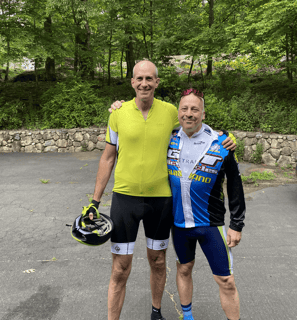.jpeg)
It’s time for the Tour de France. I have been cycling for more than two decades and love watching the race on TV each July, especially to hear Phil Liggett’s poetic coverage. Next time I get on my bike, I’ll imagine his voice describing my effective climbs and dramatic breakaways as I make my way through my own imaginary weekend Tour stages.
This year, however, my thoughts will be on maritime. The Tour calls to mind how ship owners and operators must make their way through a different kind of race, the one towards 50% decarbonisation by 2050. Read on.
I’ve struggled to increase my speed on the bike. On rides that include hills—and where I live in Connecticut all rides include hills—my average speed hovered stubbornly around 13mph (or 21kph) for years. Seemed like no matter what I did, I couldn't get faster. So, I bought myself a new racing bike, an Eddie Merkcx Mourenx 69 Disc Ultegra. That increased my speed... a bit.
Then a seasoned cyclist explained that increasing speed is a function of many factors, not just the bike (“Although,” he said, “having an efficient, well-designed bike is your foundation.”) The other factors include posture on the bike; elbow position; tuck; riding to music; tire pressure; use of brakes; the rider’s weight; interval training; how you use the handlebars…you get the idea. The point he made was : Each of these little things adds up. How much does each contribute to a faster ride? I don’t know exactly, but in terms of percentages, let’s say:

The writer wearing his own yellow jersey and fellow cyclist, Steve Cuomo
There are other factors as well. Can I double my average? Likely not, but I may be able to tweak other factors to crank out some incremental speed.
Now, think about the path to decarbonisation. Building and deploying new efficient vessels—the equivalent of buying a new racing bike—will help reduce emissions, perhaps significantly. But only deploying new vessels won’t get maritime to 50% decarbonization. As with increasing my speed on the bike, reducing emissions is a function of many factors, not just the vessel (Although having efficient, well-designed vessels is important). The other factors may include, but are not limited to:
Each of these (not so little) things adds up. How much does each contribute to decarbonisation? That’s hard to say. Switching fuels may reduce CO2 emissions by 20% but can lead to methane slip, an even more dangerous GHG.
What we can say is that at some point in the future the global fleet will be completely transformed with new, super-efficient vessels that consume different fuels, supported by financial instruments and market-driven incentives that drive sustainability and deliver long term return. But that prospect will take decades to manifest.
In the meantime, however, let’s not ignore another factor that can accelerate the path to decarbonisation:
People.
Tens of thousands of people come to work every day both on ship and on shore who make decisions that impact efficiency, profitability and the decarbonisation of their vessels and fleets. These people work in operations, chartering, technical management, the bunker desk, risk claims, demurrage, and legal and finance, not to mention all the people who work at ports and other support functions. Think of the hundreds of thousands of individual decisions they make every day, every week, every month, quarter over quarter.
Making these individual decisions in the most informed manner—where to lift bunkers? Which route to follow? Which cargos to pursue? How fast to steam? How long to sit idle at port? When to dry dock? Which berth will expedite discharging?—requires the collaboration of people, the coordination of systems and the transmission and curation of data across all of those workflows.
How much does each of these decisions contribute to decarbonisation? Again, hard to say in exact percentages terms.
But in terms of Return on Investment, customers who use Orbit to manage their fleets reduce CO2 emissions in the tens of thousands of metric tonnes each year, not to mention increases in revenue, margin and productivity. (Calculate your potential CO2 reduction and ROI here).
In training for my imaginary Tour de France*, I’ve learned it’s not just about the bike, it’s about many things. Similarly, in striving for decarbonisation, maritime should learn it’s not just about the vessel, it’s about many things, including the people.
* By the way, these days my average speed has increased to 15mph (24kph) on those hilly, local rides. Faster if there are flatter straightaways, but those are few and far between.
These Stories on Decarbonisation